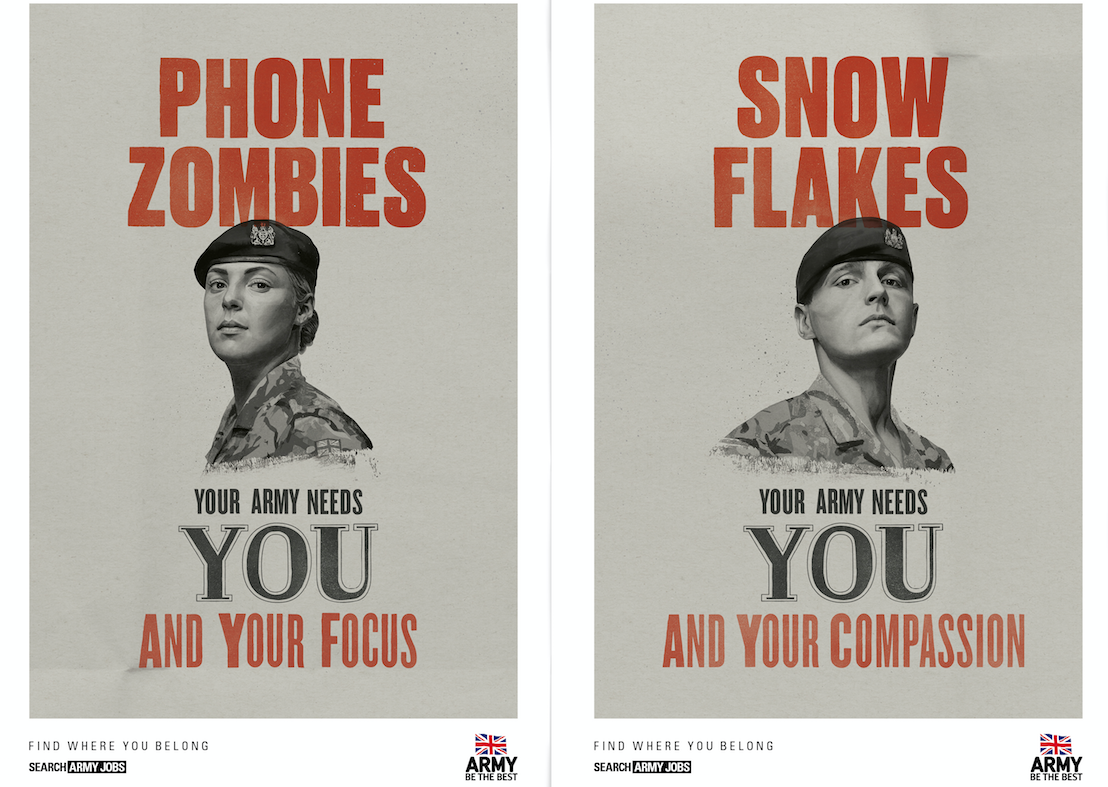Why in the age of the internet the British army needs the ‘snowflake generation’ more than ever
Their compassion in dealing with local populations, and their technological prowess, are essential qualities in any modern military operation

The British army’s latest recruitment campaign launched this week has been greeted with mixed opinion. The campaign targets the “snowflakes”, “selfie addicts” and “binge gamers” of Generation Z by overturning the negative stereotypes of their generation, translating these into qualities that are needed in the army, such as compassion, confidence and self-belief. However, critics have suggested that these adverts are appealing to people who are unsuited to the battlefield. Arguing that “snowflakes” are too vulnerable, “selfie addicts” insecure, and “gamers” too lazy. I disagree.
The campaign uses posters in the style of the famous “Your Country Needs You” Lord Kitchener First World War image, to demonstrate that the army needs the compassion of “snowflakes”, confidence of “selfie addicts”, and self-belief of “me me me millennials”. This follows last year’s “This is belonging” campaign which was built around a message of inclusiveness; and highlights the changing shift in emphasis in recruitment into the modern British army. This is not just a numbers game, the skills required in modern military operations have changed.
The proliferation of automation and artificial intelligence has not decreased the requirement for a human component in war, but it is changing the decision making and cognitive skills required of those soldiers. The army needs soldiers who have the intellectual and psychological aptitude to work in an increasingly automated operational environment, the very computer skills Generation Z have become derided for.
The expansion of access to unregulated information means that war in the “Information Age” no longer happens in far-off distant lands. Twenty-four hour news, the internet and social media mean that conflict now takes place in the public arena, and this requires a greater social awareness not typically associated with soldiering.
Ideological extremism, global migration, humanitarian crises, earthquakes and hurricanes. The nature of modern military operations is also increasingly about people, and the role of the soldier relies upon an ability to effectively engage with the local population. However, the traditional physical bravery of soldiers doesn’t necessarily translate into social courage. I have first-hand experience of this.
Last year I was deployed to the United Nations mission in the Democratic of Congo, where one of the key criticisms levied at the UN’s military presence there was its failure to effectively interact with the local population; a concern that had been written into the mission’s Security Council mandate. But just because a soldier is trained in marksmanship and military fieldcraft, does not mean he, and it is still predominantly a he, has the social confidence to interact with strangers in a foreign land.
It takes a different set of skills to engage with people with whom you do not share a culture or language, yet that is exactly what is required. The empathy and compassion of the “snowflake” generation is a quality that is vital to success in military operations. Critics who fail to recognise the benefits of this, have misunderstood the role of the modern British army.
The nature of modern warfare, and military operations has changed, along with attitudes in British society, and the army’s latest recruitment campaign reflects this. Over the last decade the culture of the British army has responded to meet these changing requirements, as well as reflect the shifts in British society which it represents. The expansion of ground close combat roles to women, drives to eradicate bullying and harassment, increased awareness of mental health and moves to bring greater stability to forces’ families, are all reflections of the ways in which the British army is adapting.
In an age of individualism, the army offers potential recruits a unique opportunity; to become part of an organisation where they can “belong”. Something that is increasingly rare in the working world. The camaraderie and strong bonds that remain unique to soldiering, have been in decline in the workforce, with the reduction in manufacturing industry, and increased mobility of modern labour. For young people with a desire for a career that allows them to make a positive difference, and be part of something bigger, the army needs you.
Heloise Goodley is a regular serving army officer (rank of major), and currently the army chief of general staff’s research fellow at Chatham House
Join our commenting forum
Join thought-provoking conversations, follow other Independent readers and see their replies
Comments
Bookmark popover
Removed from bookmarks